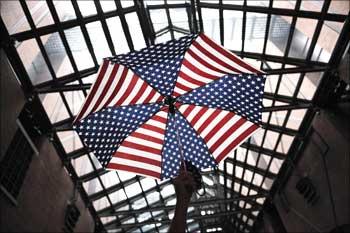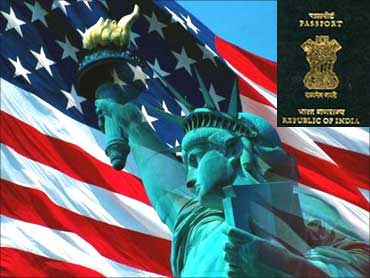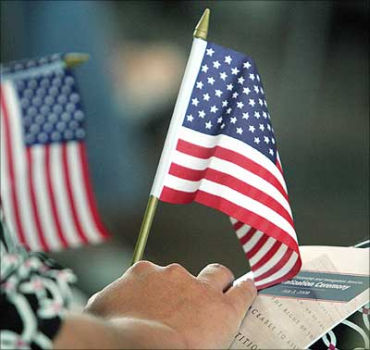Shivani Shinde in Mumbai
At a time when the country's IT firms are struggling with strict regulations on international travel, the US House of Representative has approved a Bill that tweaks the visa system and allows many more high-skilled immigrants from India and China to become permanent residents.
The legislation aims at eliminating a country-by-country cap on visas offered to skilled workers for obtaining a green card.
. . .
US House eases wait for green card
Once approved, people can apply for a green card on a first-come, first-served basis.
Currently, America makes available 140,000 skill-based green cards and limits availability to seven per cent of that allocation for each country.
Under the system, India -- with a population of over 1.21 billion -- gets a quota of roughly 3,000 green cards annually.
Such a cap means that highly-skilled US visa applicants will have to wait -- technically -- up to 70 years before getting their cards approved.
The new Bill aims to reduce the time span by removing the limit on green cards.
. . .
US House eases wait for green card
Nasscom says the bill is a positive step from the IT industry perspective.
"This will certainly ease the pressure from the other categories of work visas like H-1B," says Ameet Nivraskar, vice president of the chamber.
"However, this bill has just been passed in the House of Representatives. It has yet to get a nod from the Senate. Also, there are other administrative processes before it gets implemented."
Many believe that the waiting list of Indians for green cards would be between 50,000 and 60,000.
. . .
US House eases wait for green card
According to media reports, there will be a three-year transition before the Bill takes effect.
After that, green cards, based on employment, will be allocated on a first-come, first-served basis -- with no country-based limits.
Cyrus Mehta, a New York-based immigration attorney, says such a cap is not fair.
"For a country like India with a population of over a billion, the cap would be the same, as compared to Iceland that has a population of just 300,000.
The waiting period for people from India and China was exceptionally long," he notes.
. . .
http://im.rediff.com/money/2011/jul/29visas7.jpg
The US move, according to analysts, will help appease technology companies who have been pressuring Congress to provide more green cards for foreign employees. They are worried that the US was lagging competition elsewhere in the world due to immigrant workers being forced to leave.
The Indian IT industry, though, is not yet cheering the move. Zensar Technologies says this has no immediate favourable impact.
"We are not concerned with the number of visas, but with the sudden increase in the rejection cases," notes Ganesh Natarajan, its CEO.
"A more collaborative immigration and business visit process is what is needed now."
US House eases wait for green card
"Besides, many of them came on H-1B visas sponsored by their employers, but they cannot get a green card."
Further, H-1B visas 'generally act as a bridge' for people opting for a green card.
The overwhelming majority support that the Bill received in the House surprised lawyers and analysts in both the US and India.
The Bill, spearheaded by Jason Chaffetz, a Texas Republican and Chairman of the House Judiciary Committee, sailed through by a vote of 389 to 15, within two months of the bill being proposed in the House.
"I think it will get a positive nod from the Senate, too," notes Mehta.
. . .
US House eases wait for green card
The US move, according to analysts, will help appease technology companies who have been pressuring Congress to provide more green cards for foreign employees.
They are worried that the US was lagging competition elsewhere in the world due to immigrant workers being forced to leave.
The Indian IT industry, though, is not yet cheering the move. Zensar Technologies says this has no immediate favourable impact.
"We are not concerned with the number of visas, but with the sudden increase in the rejection cases," notes Ganesh Natarajan, its CEO.
"A more collaborative immigration and business visit process is what is needed now."








article